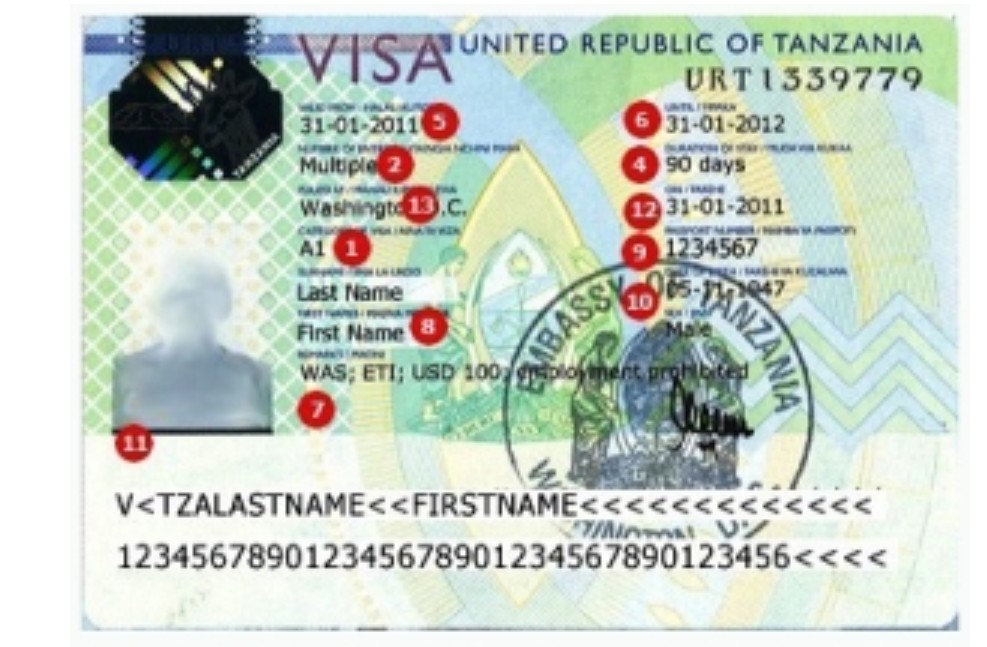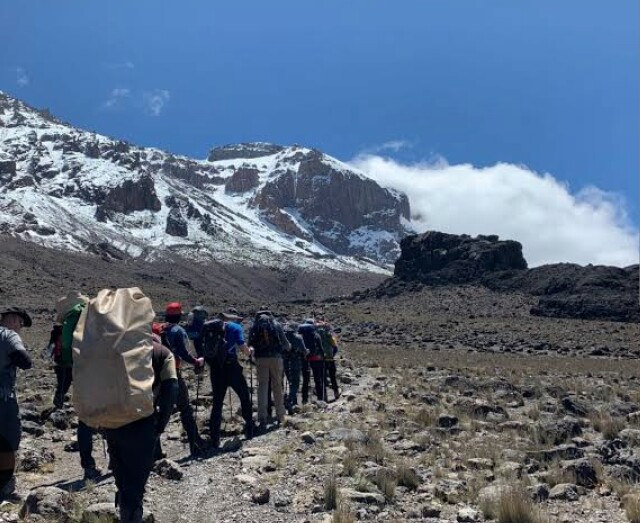

VISA Information
Foreigners seeking to enter the United Republic of Tanzania should be in the possession of valid passports or any other travel document. The passport or any other travel document is to be presented to the Immigration Control Officer at any entry point, such as Border station, Airport or Harbour. The travel document must be presented along with one of the following:Tanzania offers divers world-class reefs and plentiful schools of tropical fish just offshore of the popular beaches and secluded locations.
A valid visa or
A residence permit or A pass
N.B:
A visitor must also present an onward or return ticket together with proof that he/she has sufficient funds to support himself or herself while in Tanzania.
2. Visas
A visa is a permission granted to a foreigner who intends to enter into Tanzania for business, holiday, studies or conduct research or any other approved activities. Visas should be obtained at Tanzania Embassies/High Commissions abroad or at the entry point
After entering the country, a visitor with a visa may then obtain from the Immigration Control Officer, a pass or any other authority to stay in the country.
3. Who Requires a Visa?
All foreigners from Non-Commonwealth Countries are required to have a valid visa unless their countries have a visa abolition agreement with Tanzania. Citizens of Commonwealth countries are not required to obtain visa, unless they are citizens of the United Kingdom, Canada, Nigeria, India, Pakistan or The Republic of South Africa, Australia and New Zealand. However, the list may change from time to time
4. Types of Visas
There are five(5) types of visas valid for entry into Tanzania:
i. Ordinary Visa
An Ordinary Visa is issued at any Tanzania Mission abroad or at any official entry point into Tanzania boarder.
ii. Carrying on Temporary Assignment (CTA)
CTA is issued to prospective visitors who intend to visit Tanzania for purposes of making feasibility studies, establishing professional and business contacts, and making arrangements for investments during the start-up period. The validity of this visa is two months. This type of visa is issued at the entry point.
iii. Multiple entry Visa
Foreigners who, because of the nature of their business or investments, need to make frequent visits to the United Republic of Tanzania may be issued with Multiple- entry visa. The validity ranges from (3) months to one year. Applications for multiple-entry visa are usually submitted to the Director of Immigration services by local contacts on behalf of the applicant
iv. Referred Visa
A referred visa requires a permission of the Director of Immigration Services or the assistant Director of Immigration Services in Zanzibar. This type of a visa is required for the nationals of the following countries: Lebanon, Pakistan, Bangladesh, Nigeria, Somalia, Afghanistan, Senegal, Mali, Turkey, Iran, Iraq, Ethiopia, Syria, Egypt, Yemen, Morocco, Tunisia, Saudi Arabia, Jordan, Sri lanka, Mauritania, Sierra Leone, Niger, Liberia and for refugees, stateless people and any other nationalities as may be specified from time to time by the authorities. Persons in need of this type of visa may make enquiries at any Tanzania Mission abroad.
v. Transit Visa
A Transit Visa is a permission to pass through Tanzania from one entry point to the exit point. It is for the people whose purpose of their entry into Tanzania is simply to pass through to the other destination abroad without visiting. This type of a visa is only issued to persons with onward tickets, sufficient funds for transit, and an entry visa to the country of destination or any proof that prior arrangements have been made that satisfy this requirement. There is no special clearance for transit visa, except for those specified in paragraph 4.4 above.
5. Visa Issuing Centres and Authorities
Visas are issued by the following: The office of the Director of Immigration Services, Dar es Salaam, and the Office of the Assistant Director of Immigration Services Zanzibar. Tanzania Missions abroad Entry points to the United Republic of Tanzania, i.e. Namanga, Tunduma, Sirari, Horohoro, Kigoma Port, Julius.K. Nyerere International Airport (JKNIA), Kilimanjaro International Airport, Zanzibar Harbour and Zanzibar International Airport (ZIA) and other gazetted entry points.
6. Visa Fee Rates
Visa fee for Holiday and Ordinary visa is US $. 50. Multiple visa 6 months to 1 year is US $ 100, while 3 months multiple visa fee is US $.50. You can download the following forms, fill in then return to our offices by clicking here: [www.moha.go.tz]
7. Extension of Stay:
You can extend your visas for three months at a time up to a maximum of six months at the immigration office in Dar es Salaam.
8. Temporary Residence:
Residence permits are granted to foreign nationals if they are employed by a Tanzanian company, or working long-term as missionaries or volunteers. You must apply for these through the Immigration Services Department (www.immigration.go.tz).
OTHER REQUIREMENTS
Residence Permits
Residence permits are not issued by Tanzania Missions but rather the Immigration Department. Application for residence permits must be done and obtained prior to arriving in Tanzania. The requirements are as follows:
Work Permits
Work permits are not issued by Tanzania Missions but rather the Ministry of Labour, Employment and Youth Development. Application of work permits must be done and obtained prior to arriving in Tanzania. The requirements are: Znz Min Labour, youth, women and children dev
Filming License
Filming licenses are required must and permits to import filming equipment must be obtained prior arrival in the country.
Tanzania offers divers world-class reefs and plentiful schools of tropical fish just offshore of the popular beaches and secluded locations.
1. Entry Requirements
Foreigners seeking to enter the United Republic of Tanzania should be in the possession of valid passports or any other travel document. The passport or any other travel document is to be presented to the Immigration Control Officer at any entry point, such as Border station, Airport or Harbour. The travel document must be presented along with one of the following:
A valid visa or
A residence permit or
A pass
N.B:
A visitor must also present an onward or return ticket together with proof that he/she has sufficient funds to support himself or herself while in Tanzania.
2. Visas
A visa is a permission granted to a foreigner who intends to enter into Tanzania for business, holiday, studies or conduct research or any other approved activities.
Visas should be obtained at Tanzania Embassies/High Commissions abroad or at the entry point.
After entering the country, a visitor with a visa may then obtain from the Immigration Control Officer, a pass or any other authority to stay in the country.
3. Who Requires a Visa?
All foreigners from Non-Commonwealth Countries are required to have a valid visa unless their countries have a visa abolition agreement with Tanzania.
Citizens of Commonwealth countries are not required to obtain visa, unless they are citizens of the United Kingdom, Canada, Nigeria, India, Pakistan or The Republic of South Africa, Australia and New Zealand. However, the list may change from time to time.
4. Types of Visas
There are five(5) types of visas valid for entry into Tanzania:
i. Ordinary Visa
An Ordinary Visa is issued at any Tanzania Mission abroad or at any official entry point into Tanzania boarder.
ii. Carrying on Temporary Assignment (CTA)
CTA is issued to prospective visitors who intend to visit Tanzania for purposes of making feasibility studies, establishing professional and business contacts, and making arrangements for investments during the start-up period. The validity of this visa is two months. This type of visa is issued at the entry point.
iii. Multiple entry Visa
Foreigners who, because of the nature of their business or investments, need to make frequent visits to the United Republic of Tanzania may be issued with Multiple- entry visa. The validity ranges from (3) months to one year.
Applications for multiple-entry visa are usually submitted to the Director of Immigration services by local contacts on behalf of the applicant
iv. Referred Visa
A referred visa requires a permission of the Director of Immigration Services or the assistant Director of Immigration Services in Zanzibar. This type of a visa is required for the nationals of the following countries: Lebanon, Pakistan, Bangladesh, Nigeria, Somalia, Afghanistan, Senegal, Mali, Turkey, Iran, Iraq, Ethiopia, Syria, Egypt, Yemen, Morocco, Tunisia, Saudi Arabia, Jordan, Sri lanka, Mauritania, Sierra Leone, Niger, Liberia and for refugees, stateless people and any other nationalities as may be specified from time to time by the authorities. Persons in need of this type of visa may make enquiries at any Tanzania Mission abroad.
v. Transit Visa
A Transit Visa is a permission to pass through Tanzania from one entry point to the exit point. It is for the people whose purpose of their entry into Tanzania is simply to pass through to the other destination abroad without visiting. This type of a visa is only issued to persons with onward tickets, sufficient funds for transit, and an entry visa to the country of destination or any proof that prior arrangements have been made that satisfy this requirement. There is no special clearance for transit visa, except for those specified in paragraph 4.4 above.
5. Visa Issuing Centres and Authorities
Visas are issued by the following:
The office of the Director of Immigration Services, Dar es Salaam, and the Office of the Assistant Director of Immigration Services Zanzibar.
Tanzania Missions abroad
Entry points to the United Republic of Tanzania, i.e. Namanga, Tunduma, Sirari, Horohoro, Kigoma Port, Julius.K. Nyerere International Airport (JKNIA), Kilimanjaro International Airport, Zanzibar Harbour and Zanzibar International Airport (ZIA) and other gazetted entry points.
6. Visa Fee Rates
Visa fee for Holiday and Ordinary visa is US $. 50. Multiple visa 6 months to 1 year is US $ 100, while 3 months multiple visa fee is US $.50.
You can download the following forms, fill in then return to our offices by clicking here: [www.moha.go.tz]
7. Extension of Stay:
You can extend your visas for three months at a time up to a maximum of six months at the immigration office in Dar es Salaam.
8. Temporary Residence:
Residence permits are granted to foreign nationals if they are employed by a Tanzanian company, or working long-term as missionaries or volunteers. You must apply for these through the Immigration Services Department (www.immigration.go.tz).
OTHER REQUIREMENTS
Residence Permits
Residence permits are not issued by Tanzania Missions but rather the Immigration Department. Application for residence permits must be done and obtained prior to arriving in Tanzania. The requirements are as follows:
Work Permits
Work permits are not issued by Tanzania Missions but rather the Ministry of Labour, Employment and Youth Development. Application of work permits must be done and obtained prior to arriving in Tanzania. The requirements are: Znz Min Labour, youth, women and children dev
Filming License
Filming licenses are required must and permits to import filming equipment must be obtained prior arrival in the country.



